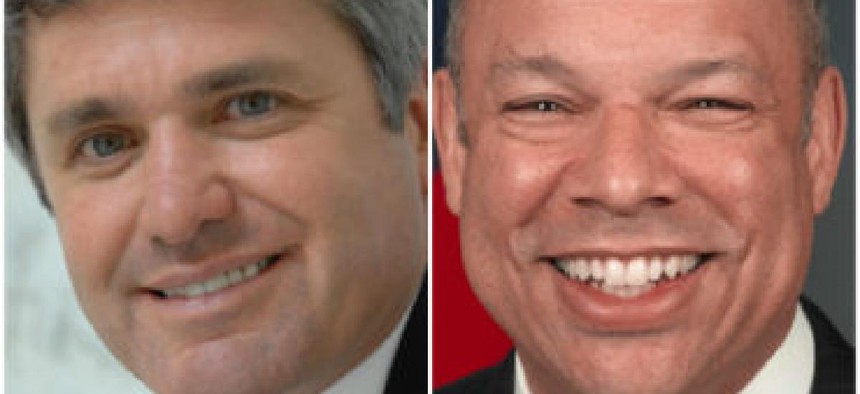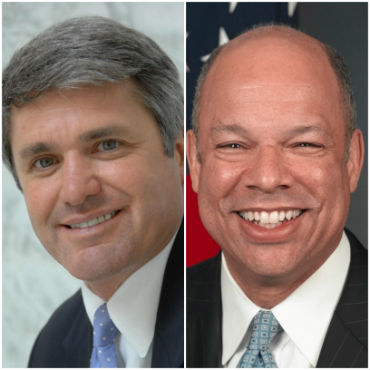McCaul wants to tighten oversight of DHS

Entering his final term as chairman of the House Homeland Security Committee, Rep. Michael McCaul hopes to sharpen his panel's legislative control over DHS.

Rep. Michael McCaul (R-Texas), chairman of the House Homeland Security Committee, and Jeh Johnson, secretary of the Department of Homeland Security
When it comes to congressional oversight, the Department of Homeland Security answers to multiple bosses. In the House alone, nine committees have jurisdiction over some aspect of the department. Rep. Michael McCaul (R-Texas), chairman of the House Homeland Security Committee, is pushing for a reorganization that would concentrate oversight power in his committee.
"We're putting jurisdiction over the national security in our Congress today," McCaul said at a Nov. 30 event at the Bipartisan Policy Center in Washington.
DHS hasn't been reauthorized since the 2002 legislation that unified more than 20 government agencies under a single umbrella. McCaul complained that Congress and DHS are "paralyzed" by the current state of affairs. DHS officials are "constantly preparing for testimony" for multiple committees, and legislators have trouble moving bills through to passage.
McCaul, who is about to begin his final term as chairman of the committee under Republican Conference term limits, said he had to refer the recent DHS Reform and Improvement Act to the nine House committees that share jurisdiction with his panel. The bill includes a measure to operationalize and reorganize the National Protection and Programs Directorate as the Cybersecurity and Infrastructure Protection Agency -- a plan that DHS Secretary Jeh Johnson has said is essential to improve DHS’ authority over cybersecurity.
"How in the world can I get anything done as chairman?" McCaul asked.
He noted that the 2015 Cybersecurity Act became law only because it was included in must-pass appropriations legislation. "That says it all about the breakdown in jurisdiction," he added.
Johnson, who also spoke at the event, said having so many committees with a say over DHS can be time-consuming for agency officials. In the past year, 299 DHS witnesses testified at 208 hearings, and Johnson said he himself testified 26 times before multiple committees and subcommittees, "some of whom I've never even heard of. It keeps us very, very busy."
McCaul is looking for the same level of control over DHS that the House Armed Services Committee has over Pentagon operations and the House Foreign Affairs Committee has over the State Department. He plans to propose an amendment to the rules package in the 115th Congress to centralize authorization and oversight of DHS with his committee.
"I think we've got support of the national security chairmen," McCaul said. But even with backing from the defense and intelligence panels, it's not clear whether there is an appetite for the change among rank-and-file lawmakers or among the leaders of the nine committees that would have to cede some authority to make McCaul's plan work.
"In Congress, committee jurisdiction is power," said former lawmaker Jane Harman, who spoke at the event. "It's not a zero-sum game for the country, but it is for Congress."
Also unknown for now is whether the Senate Homeland Security and Governmental Affairs Committee is looking for a similar concentration of authority. An inquiry to the office of Chairman Sen. Ron Johnson (R-Wis.) was not answered as of this writing.
On deck at DHS
Johnson declined to comment on whom he wanted President-elect Donald Trump to appoint to replace him or to rank favorites among the various candidates for the job who have been mentioned in media reports.
But Johnson took the opportunity to advise his successor to "continue our efforts at management reform."
Johnson said DHS was "way too stovepiped" when he took over in 2013. In the past three years, he said he has led improvements in management, acquisition, hiring, budgeting and morale across the 22 agencies that make up DHS.
He also hopes that plans to build a new headquarters for the agency will move ahead under the Trump administration. "Continuing the work we've done is vital," Johnson said.



